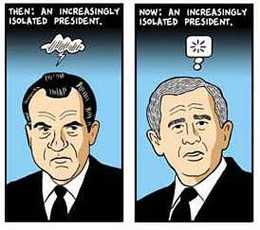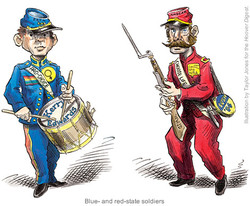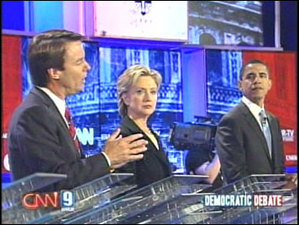Following is the essay you can designate as Vol. 1I, Number 1 of A-Clue.Com, my weekly newsletter. Enjoy.
The year 2008 represents the start of the generational crisis we’ve been sliding toward for decades. The games of the last two years are over. Now we get serious.
That’s because the myths and values of the Nixon Thesis, on which our political assumptions and power are based, have proven themselves irrelevant. (Image from Tom Tomorrow.)
It’s not that they don’t answer the questions of today. They don’t address those questions. They weren’t meant to.
The Nixon Thesis of Conflict holds that we must hold "them" in check to save the nation. In terms of foreign policy, them meant Communists. Russian Communists. Chinese Communists. In the context of the time, Vietnamese Communists. Vietnam was a Cold War activity, and the Nixon Thesis was designed, first and foremost, to support the Cold War. It made that war the nation’s partisan divide, with the dominant side supporting it without question. With 9-11 the enemy simply changed — the 1990s represented the Thesis’ search for this new enemy.
Domestically the Nixon Thesis of Conflict also opposed "them" — represented by any force which questioned societal norms in dress, demeanor, values or lifestyle. Initially this referred to the Dirty Fucking Hippies and their enablers in the academies and the media. Gradually, as that threat receded, new groups were thrown off the majority coalition — first feminists, then blacks, then gays, then browns. Those who protested at the exclusion of these interests were also tossed overboard, and the full weight of societal scorn heaped upon them.
The cutting edge of politics is always changes in the law, and the
Culture War was always an attempt to change laws so that those deemed
immoral could also be tossed in jail as illegal. Laws already in force
against enemy groups were tightened, strengthened, enhanced, as the
condemnation grew necessarily louder and the fear of becoming one of
the condemned could also grow. (Picture from the Hoover Institution, a 2004 article denying the reality it had helped create, as that reality came to be an inconvenient truth.)
To feed the fear of enemies within and without, economic assumptions
also changed. Why fear becoming isolated unless condemnation had
real consequences? Thus economic policy tilted increasingly toward
those who most fiercely supported the Thesis. Those dependent upon the
Thesis’ largess — whether in the media, on Wall Street, or in
Washington — became increasingly wealthy. The rest were left to wonder
if, perhaps, there wasn’t something wrong with them.
The Thesis survived Nixon, and gave us Reaganism. It survived Reagan
and gave us Bushism. It brought us Newt Gingrich and neutered
Clintonism, condemning the President who leaned against the Thesis, who
represented its AntiThesis, as a villain and a rogue.
But the Nixon Thesis has nothing to say about today’s problems.
Conflict won’t solve our energy problems. Conflict won’t solve global
warming. Conflict won’t enable this world to support the 6 billion, and
more, who now occupy it, in anything like the consumer lifestyle the
West expects and demands for itself.
This answers the question put by Paul Krugman
in his column today. Republicans continue to support Bush because they
have no other belief system. They have thrown all those who might
question their Thesis overboard. They are left with nothing to unite them but belief
in a political God who no longer exists.
In this they are just like the
Republicans who re-nominated Herbert Hoover two generations ago, just like
those Democrats who believed in Hubert Humphrey a generation ago. To put it
in a context kids learn about in school, they’re like the
Jacksonian Democrats of the 1850s, those who elected Pierce and
Buchanan, the Stephen A. Douglas Democrats who continued to insist the Union could endure half-slave and
half-free.
Democrats do not have the answers to this Crisis.
But most of them
are at least asking the right questions.
- How will we power ourselves?
- How will we save Florida from global warming?
- What must be done to keep
economic hope alive in this new age?
They are united on
principles, and their candidates for President all stand in general
agreement — their differences are in personality and approach. These are important questions. Democrats are choosing the next President.
But here’s the important point I want you to remember as 2008 unfolds.
The election does not solve the crisis.
The election begins a process of groping toward solutions. The election asks the right questions, but does not by itself come up with answers. The
President we elect has the potential to be great — a Lincoln, a
Roosevelt. They also have the potential to be among our greatest
villains — a Nixon, a McKinley.
By the end of this year, we will at last be asking the
questions whose answers, I believe, reside in the Internet Thesis, in
the myths and values of this medium. We will, by the end of this year,
have left the TV era behind. History will show we have embarked on a
new American Adventure.
That could lead us onto the rocks. The American Experiment could end
in the next few years — in economic collapse, in civil war, in a
refusal to address environmental catastrophe. It would then be up to
some other nation, and failing that some other species, to take this
world forward.
The world will go on. It doesn’t need you, it doesn’t need America,
it doesn’t even need mankind when you get right down to it. The problems
of our time will be addressed, either with success or catastrophe.
History is what we make of it.
History starts now.
Happy New Year?













